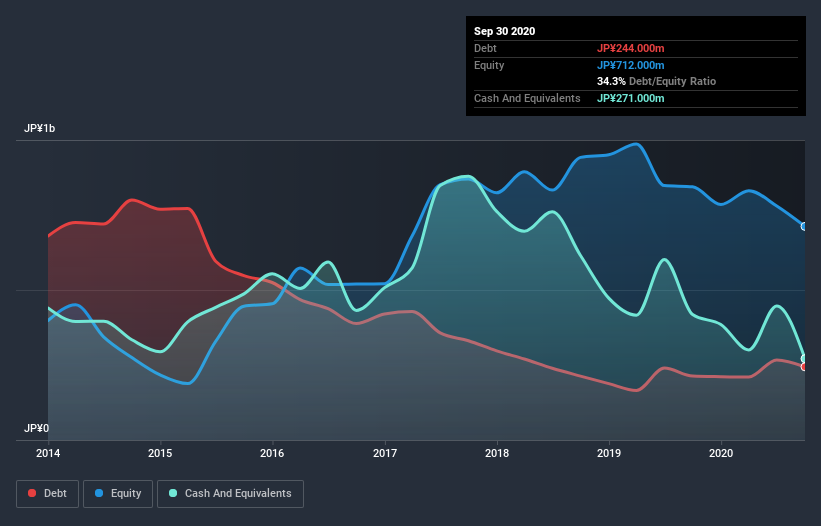Warren Buffett famously said, 'Volatility is far from synonymous with risk.' So it seems the smart money knows that debt - which is usually involved in bankruptcies - is a very important factor, when you assess how risky a company is. Importantly, Nextware Ltd. (TYO:4814) does carry debt. But should shareholders be worried about its use of debt?
What Risk Does Debt Bring?
Debt and other liabilities become risky for a business when it cannot easily fulfill those obligations, either with free cash flow or by raising capital at an attractive price. If things get really bad, the lenders can take control of the business. However, a more frequent (but still costly) occurrence is where a company must issue shares at bargain-basement prices, permanently diluting shareholders, just to shore up its balance sheet. Having said that, the most common situation is where a company manages its debt reasonably well - and to its own advantage. The first step when considering a company's debt levels is to consider its cash and debt together.
View our latest analysis for Nextware
What Is Nextware's Debt?
You can click the graphic below for the historical numbers, but it shows that as of September 2020 Nextware had JP¥244.0m of debt, an increase on JP¥213.0m, over one year. But on the other hand it also has JP¥271.0m in cash, leading to a JP¥27.0m net cash position.

How Healthy Is Nextware's Balance Sheet?
Zooming in on the latest balance sheet data, we can see that Nextware had liabilities of JP¥552.0m due within 12 months and liabilities of JP¥82.0m due beyond that. On the other hand, it had cash of JP¥271.0m and JP¥430.0m worth of receivables due within a year. So it actually has JP¥67.0m more liquid assets than total liabilities.
This short term liquidity is a sign that Nextware could probably pay off its debt with ease, as its balance sheet is far from stretched. Simply put, the fact that Nextware has more cash than debt is arguably a good indication that it can manage its debt safely. There's no doubt that we learn most about debt from the balance sheet. But it is Nextware's earnings that will influence how the balance sheet holds up in the future. So when considering debt, it's definitely worth looking at the earnings trend. Click here for an interactive snapshot.
In the last year Nextware had a loss before interest and tax, and actually shrunk its revenue by 3.9%, to JP¥3.1b. We would much prefer see growth.
So How Risky Is Nextware?
Statistically speaking companies that lose money are riskier than those that make money. And we do note that Nextware had an earnings before interest and tax (EBIT) loss, over the last year. Indeed, in that time it burnt through JP¥166m of cash and made a loss of JP¥132m. However, it has net cash of JP¥27.0m, so it has a bit of time before it will need more capital. Overall, its balance sheet doesn't seem overly risky, at the moment, but we're always cautious until we see the positive free cash flow. There's no doubt that we learn most about debt from the balance sheet. However, not all investment risk resides within the balance sheet - far from it. To that end, you should learn about the 3 warning signs we've spotted with Nextware (including 1 which is doesn't sit too well with us) .
If you're interested in investing in businesses that can grow profits without the burden of debt, then check out this free list of growing businesses that have net cash on the balance sheet.
When trading Nextware or any other investment, use the platform considered by many to be the Professional's Gateway to the Worlds Market, Interactive Brokers. You get the lowest-cost* trading on stocks, options, futures, forex, bonds and funds worldwide from a single integrated account. Promoted
Valuation is complex, but we're here to simplify it.
Discover if Nextware might be undervalued or overvalued with our detailed analysis, featuring fair value estimates, potential risks, dividends, insider trades, and its financial condition.
Access Free AnalysisThis article by Simply Wall St is general in nature. It does not constitute a recommendation to buy or sell any stock, and does not take account of your objectives, or your financial situation. We aim to bring you long-term focused analysis driven by fundamental data. Note that our analysis may not factor in the latest price-sensitive company announcements or qualitative material. Simply Wall St has no position in any stocks mentioned.
*Interactive Brokers Rated Lowest Cost Broker by StockBrokers.com Annual Online Review 2020
Have feedback on this article? Concerned about the content? Get in touch with us directly. Alternatively, email editorial-team@simplywallst.com.
About TSE:4814
Flawless balance sheet with low risk.
Market Insights
Community Narratives




